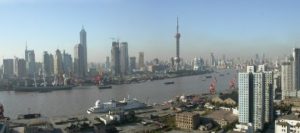Neoclassical economics III: a machine to destroy the world
Geoff Davies

The false nostrums of the pseudo-science of neoclassical economics have been used to create a system promoting endlessly increasing consumption of resources and endless elaboration of technology. This system already operates far beyond the needs of people.
Our survival requires that we rein in the machine and return to proven and durable, social and moral forms of organisation.
Growth has a fundamental place in the biological world, of which we humans are a part. Unchecked growth has no place, outside of the microbial world. Unchecked growth is called a plague, an epidemic or a cancer.
Growth, among mainstream economists, has become a reflexive, mindless goal, specifically growth of the Gross Domestic Product. Growth of the GDP is the dominant global criterion for allegedly successful management of an economy. GDP is an indiscriminate measure of what we spend money on: some things good, some useless, some bad and, increasingly, some attempting to repair damage from previous spending. GDP is not a useful measure of our quality of life, whose improvement can and should be the real goal, but it does correlate with resource use and with resource waste, known as pollution.
The claim that unchecked competitive markets are the most efficient way to increase material wealth has no basis, as I explained in Part II. Nor have free markets worked in practice. Australia’s economic performance post-1983 has never come close to that in the 1950s and 60s when it averaged annual GDP growth of 5% and unemployment 1.3%.
However economists and the self-interested rich have promoted a system based on unrestrained markets that in turn promotes anything that yields short-term profit. Thus we have unsustainable extraction of natural resources, and for-profit aged care that consigns our grandparents to disgusting neglect.
We also have potent and dangerous new technologies like face recognition, meta-data analysis, artificial ‘intelligence’ and various biotechnologies including, imminently, the suspension of biological ageing. The planet really needs a plague of demanding, smart-aleck old farts. The surveillance state is a reality, and rapidly gaining in power and pervasiveness. I am only mentioning war making and killer robotics.
Some older people occasionally wonder why the forecasts of our childhood have not come to pass. We were told that by the year 2000 no-one would work more than 15 hours a week. The reason is that we have been kept on the treadmill so as to keep the GDP increasing. A major motivator has been the so-called ‘labour market flexibility’, the notion that your labour is just a free-market disposable commodity that needs to be used to maximum efficiency and effect. One difficulty of course is that your labour comes with you attached. The primary effects have been to keep the employed insecure and to enrich the rich and empower the powerful.
The recently-deceased David Graeber addressed another aspect of the tread- mill in his book Bullshit Jobs. He found that nearly half of office jobs are use- less, or even harmful, according to those occupying them. He also found that payment is in rough inverse proportion to the usefulness of the job, so a garbage collector is paid very little, a receptionist making her boss look very important is paid more, and a corporate lawyer defending his firm against other corporate lawyers is very well paid, not- withstanding that collectively they are able to accomplish very little.
Exploitation is nothing new. Six thous- and years ago human beings started over-exploiting local environments, animals and lower-rank humans, using the new-fangled agriculture, and soon the Pharaohs over-exploited the slaves and paid little attention to the environment supporting everyone.
Five hundred years ago bands of rapacious aliens started invading many parts of the world and carrying off material wealth, people and well-being. Those aliens were from Europe. The European tribes had been fighting amongst them- selves for centuries and they became very skilled at it. I learnt only recently that H. G. Wells’ War of the Worlds was inspired by events that occurred in our own, notorious, Van Diemen’s Land.
Two hundred and fifty years ago people discovered how to harness fossil fuels, debt and competitive markets to hyper- charge the exploitation of everything, everywhere.
The fact that there has been a moderately widespread increase in material wealth since then is taken as proof that fossil-fuelled markets are good. It is true that even some of the common people gained more wealth, erratically, through this period. However their share of the overall wealth was not simply gifted by the rich, it was wrestled from them by people who managed to band together in unions and other common causes.
There are still many poor in the world, and their ranks are growing again.
Meanwhile we watch with trepidation as the clever innovators create technologies whose power and implications are difficult to comprehend, except they are tampering with the deep and ancient order of the living world, of which we are still inextricably a part. Why do they do it? Because it is there to be done, and someone will pay them for it.
Our popular culture is well aware of the dangers of our trajectory, as manifest in dystopian tales of many kinds. However I can’t remember any tale of the future that portrays a happy, pleasant Earth, or even a reasonably tolerable one, with a future of its own. We stare in fascination at our predicament, but most of us don’t know what to do about it, and think it is inevitable anyway.
The practices and technologies to stop warming the planet and trashing its environment are available and well known, to anyone who looks. We can also manage the incentives our markets operate under, instead of leaving the incentives to chance and the manipulators. At present it is generally profit- able to exploit people and trash the planet. If we make it profitable to nurture people and the planet we might be surprised how quickly things improve.
That is what a carbon emissions price was supposed to do, for example.
The implicit goal of our present system is the creation and discarding of more and more stuff. It’s a bullshit job.
We can live well if we choose. The bigger challenge now is to displace the narrative of selfishness and entrepreneurial competition so we actually make that choice, collectively.
If we make our goal the indefinite improvement of the quality of our lives, and societies, there are other things we can do. We can make Enough the centre of our lives. We can acknowledge that we are in fact highly social. We can cultivate the community we are part of. We can appreciate that to love and be loved is what leads to a fulfilling life. We can connect or re-connect with nature, so we might glimpse our real place in the world.
It may be hard for us jaded moderns to believe, but many people have lived well this way, and their ways of life endured far longer than ours. Traditional values, indigenous values, developed over millennia because they work. This does not mean returning to only traditional technologies. If you live by traditional values you won’t destroy the world.
Source: John Menadue’s blog, 23 Sep 2020 Neoclassical economics III: a machine to destroy the world – Pearls and Irritations
Dr Geoff Davies is a retired scientist who has explored economics for more than two decades. He has authored many books.































